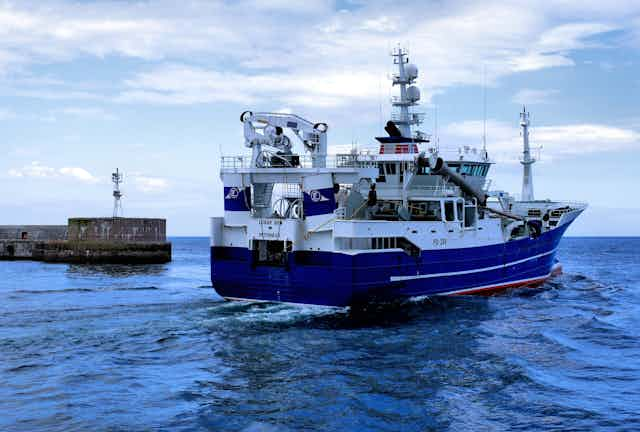The fishing industry constitutes a small but powerful voice when it comes to Brexit negotiations. Who gets to fish in UK waters and how much they get to fish, as well as the UK fishing industry’s access to EU markets, have been front and centre of debates over the UK’s future relationship with the EU.
It’s widely recognised that the UK fishing industry voted for Brexit. The Common Fisheries Policy (CFP), which regulates fishing rights in the EU, is seen as a huge source of discontent among UK fishermen. But having interviewed key people in northeast Scotland’s fishing industry this summer, our conversations revealed a much more nuanced position on Brexit than is often portrayed in the media.
Perhaps most notably, some fishermen suggested that Brexit is not entirely about reversing the CFP, in the sense that foreign vessels should be banned from accessing UK fish stocks in UK waters. Rather, it is about the UK managing its own waters after Brexit more fairly than is possible within the CFP. There is an awareness that most UK fish exports are destined for EU markets and so maintaining a good working relationship is important. For example, one fisherman said:
I’m not also advocating that no foreign boat should be allowed in the UK, that would be wrong in my opinion. They have historical rights as well fishing our waters, it’s just the allocation of it.
Fair fishing for all
In fact, the CFP is credited with some positives, such as bringing in management rules that helped the industry survive. But most agree that the CFP is now a burden to the industry that imposes impractical rules like the discard ban and gives away a UK resource at the cost of the UK fishing industry. As one fisherman put it:
To me the Common Fisheries Policy has been a disastrous policy for the fishing industry round the UK. Okay, it’s conserved the stocks but it’s decimated the fishing communities round about the UK.

There is also an awareness of the possibility that the fishing industry ends up in a worse position, if negotiations with the EU go badly. What they want is for the UK government to provide a plan that ensures the future of their industry and their communities, while dealing fairly with fishermen from the EU, where a significant part of their business plan relies on access to UK waters.
This understanding of the potential plight of their fellow fishermen from Europe, were the UK waters to be closed to foreign vessels, is reflected in one person’s comments:
I do not think it is fair that on a vote of the UK that a man who has built up a business in Denmark, Holland, France all of a sudden loses out overnight. I think we should be man enough to say we’re changing the rules and we’re going to do it over a ten to 15-year period.
There is also concern that the current Brexit transition period leaves the fishing industry within the CFP while the UK has no say in its operation. But this is minor compared to the fear that the UK will leave the EU and remain in the CFP.
Little confidence in negotiations
Interviewees recognise that the fishing industry is of low economic importance to the UK and have little confidence in the negotiation. The largest concern is that, as part of the negotiations to withdraw from the EU, the fishing industry is used as leverage in wider trade negotiations and ends up in the same or a worse position. One person said:
It will just be a bargaining chip, the industry is nothing to the GDP in the UK, it’s less than 1%. Well, if you go to Denmark, you go to Holland, they all fight for their fishermen. France, Spain, you take the financial market in London, they’ll sacrifice the fishing industry to keep it.
The industry also cares about a future EU-UK trade deal, as the majority of fish products exported from the UK go to the EU. Currently, there are no tariffs or customs checks on these products. But there are concerns that tariffs on seafood exports would increase the price of their products which could reduce sales. Plus, any delays from customs checks would reduce the quality of the fresh produce as it increases the time between catching and arriving at supermarkets and restaurants on the continent. One fisherman summed up his concerns on trade and markets:
I think the main risk is our markets in Europe. I have a fear that there’s a closed-door there and we have a perishable commodity and we have lorries backing up at the channel and fish decreasing in quality, you know, that can hit the price in the market for us.
Clearly, there are fears over how things will pan out. The fishing industry voted for Brexit to escape the rules and regulations of the CFP, many of which are seen as troublesome at best. But the ongoing Brexit negotiations have provided no certainty or clarity to the fishing industry, which both fears its decline and hopes for an outcome that enables a renaissance in the UK’s coastal communities.

